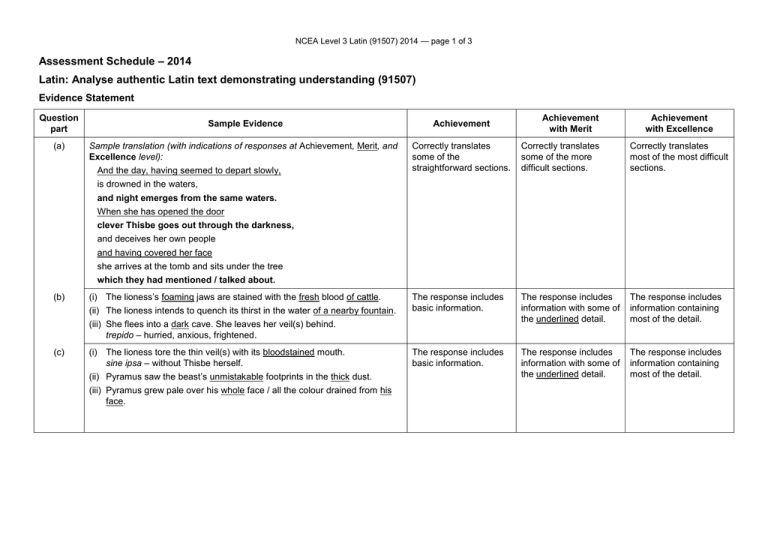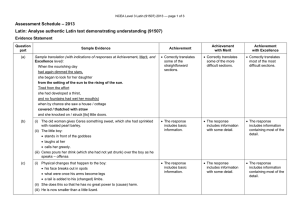– 2014 Assessment Schedule Latin: Analyse authentic Latin text demonstrating understanding (91507)
advertisement

NCEA Level 3 Latin (91507) 2014 — page 1 of 3 Assessment Schedule – 2014 Latin: Analyse authentic Latin text demonstrating understanding (91507) Evidence Statement Question part (a) Achievement with Merit Achievement with Excellence Sample Evidence Achievement Sample translation (with indications of responses at Achievement, Merit, and Excellence level): Correctly translates some of the straightforward sections. Correctly translates some of the more difficult sections. Correctly translates most of the most difficult sections. The response includes basic information. The response includes information with some of the underlined detail. The response includes information containing most of the detail. The response includes basic information. The response includes information with some of the underlined detail. The response includes information containing most of the detail. And the day, having seemed to depart slowly, is drowned in the waters, and night emerges from the same waters. When she has opened the door clever Thisbe goes out through the darkness, and deceives her own people and having covered her face she arrives at the tomb and sits under the tree which they had mentioned / talked about. (b) (i) The lioness’s foaming jaws are stained with the fresh blood of cattle. (ii) The lioness intends to quench its thirst in the water of a nearby fountain. (iii) She flees into a dark cave. She leaves her veil(s) behind. trepido – hurried, anxious, frightened. (c) (i) The lioness tore the thin veil(s) with its bloodstained mouth. sine ipsa – without Thisbe herself. (ii) Pyramus saw the beast’s unmistakable footprints in the thick dust. (iii) Pyramus grew pale over his whole face / all the colour drained from his face. NCEA Level 3 Latin (91507) 2014 — page 2 of 3 Question part (d) Achievement Achievement with Merit Achievement with Excellence Correctly scans the first four feet of BOTH lines Correctly scans the first four feet of BOTH lines Correctly scans the first four feet of BOTH lines, including ONE principal caesura OR AND AND Correctly scans the first four feet of ONE line AND makes a relevant comment on that scansion. Makes a relevant comment on the scansion of ONE line. Makes a detailed, relevant comment on the scansion of BOTH lines. Correctly parses ONE word, and explains its grammar Correctly parses TWO words, and explains the grammar of ONE of the words Correctly parses THREE words, and explains the grammar of TWO of the words. OR OR Correctly parses TWO words. Correctly parses THREE words. Identifies and explains the use of TWO literary devices. Identifies and expands on the use of THREE literary devices. Sample Evidence (i) Scansion: Line 103: dūm rĕdĭt | īn sīl|vās, || īn|vēntōs | fōrtĕ sĭn|(e) īpsā̆ (dsss) Line 104: ōrĕ crŭ|ēntā|tō || tĕnŭ|ēs lănĭ|āvĭt ă|mīctū̆s (dsdd) (ii) Possible reasons that the metre enhances the meaning of the lines: the mostly spondaic line 103 emphasises the slow, languid pacing of the lioness as it heads back to the woods after quenching its thirst this contrasts sharply with the more dactylic line 104, which accentuates the lioness’s frenzied savaging of the veil the late elision in the final foot of line 103 underlines the fact that Thisbe is not there and not at risk. Other responses possible. (e) (i) fugit – present tense. The conjunction dum (while) is normally followed by the present tense, even for describing past events as it does here. (ii) multa – ablative singular. It is ablative because it agrees with / describes unda, which is ablative of instrument / means. (iii) amictus – accusative plural. It agrees with inventos and tenues. (f) Possible examples of linguistic, stylistic, and poetic devices, and how their use enhances the meaning of the passage include: the reversed word order of the short, blunt phrase audacem faciebat amor emphasises Thisbe’s recklessness, and strengthens the metaphor of Love controlling Thisbe’s actions the diction of callida (cunning), fallit (deceives), and adoperta vultum (with her face covered) stresses the extent of the deception and concealment to which the young lovers are prepared to go the elision of the final syllable of totoque reinforces the gasp as all the colour suddenly drains from Pyramus’s face when he sees the lioness’s footprints the enjambement of Pyramus and delay of the subject until the end of the sentence adds to the sense of shock when Pyramus sees the footprints and no sign of Thisbe. Identifies and fully expands on the use of FOUR literary devices. NCEA Level 3 Latin (91507) 2014 — page 3 of 3 Other responses possible. N1 Partially interprets particular points in the text, but does not demonstrate understanding. N2 Interprets particular points in the text, but does not demonstrate understanding. A3 A4 M5 M6 E7 E8 Demonstrates understanding of THREE A bullet points. Demonstrates understanding of FOUR A bullet points. Demonstrates clear understanding of THREE M bullet points. Demonstrates clear understanding of FOUR M bullet points. Demonstrates thorough understanding of THREE E bullet points, giving appropriate and unambiguous evidence. Demonstrates thorough understanding of FOUR E bullet points, giving appropriate and unambiguous evidence. N0/ = No response; no relevant evidence. Cut Scores Score range Not Achieved Achievement Achievement with Merit Achievement with Excellence 0–2 3–4 5–6 7–8

